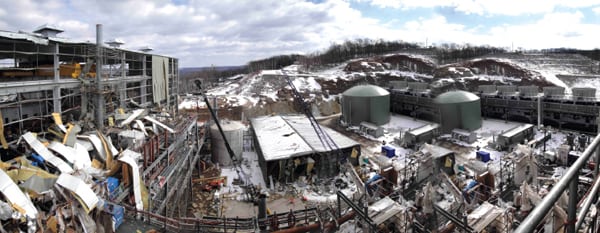Industry Shift in Gas Line Cleaning Practice
In our September 2011 issue, Fluor Corp.’s “Best Practices for Natural Gas Line Cleaning” were presented for the startup of natural gas–fired combined cycle plants. Since publication of that article, the National Fire Protection Association (NFPA) has issued a new standard for gas line cleaning in response to the urgent recommendations prepared by the U.S. Chemical Safety Board (CSB). The new NFPA standard now takes precedence over all other cleaning techniques.
The new standard, “NFPA 56PS: Standard for Fire and Explosion Prevention During Cleaning and Purging of Flammable Gas Piping Systems,” was released on Sept. 27, 2011. According to the NFPA, “The new standard was developed in the wake of the 2010 explosion at the under-construction Kleen Energy Power Plant in Middletown, Conn. that killed six workers and injured nearly 50 others and a subsequent investigation by the CSB.” (See “Natural Gas Piping: It’s Time for Better Risk Control” in our May 2010 issue, available in the POWER archives at https://www.powermag.com.) As part of the commissioning process for the Connecticut facility, highly pressurized flammable gas (natural gas) was used to clean debris from the piping and was then discharged without controls into the atmosphere, causing the explosion (Figure 1).
 |
| 1. Connecticut calamity. Workers at the Kleen Energy Systems plant in Middletown, Conn., attempted to clean debris in the plant’s fuel gas line with 650 psi natural gas. The gas purge, vented inside the plant building, found an ignition source and exploded. Six workers were fatally injured and more than 50 workers were injured. The financial cost of the explosion has been estimated at up to a billion dollars. Courtesy: Chemical Safety Board |
When the CSB completed its investigation of the incident, it issued recommendations to various parties, including the NFPA. The NFPA acted promptly, forming a new technical committee and charging it with the responsibility to develop a new standard. NFPA 56PS addresses not only the cleaning practice known as “gas blows” but also a broad range of gas process activities, such as pipe cleaning, repair, replacement, and removal procedures conducted at power plants and industrial, institutional, and commercial applications.
Generally, the new NFPA 56PS:
- Prohibits use of flammable gas for internal cleaning of piping systems.
- Covers activities including cleaning new or repaired piping systems, placing piping systems into service, and removing piping systems from service.
- Requires development of written procedures and a safety validation of procedures by competent persons.
- Provides examples of purge procedure based on requirements in the standard.
Prior to the release of NFPA 56PS, Fluor Corp. revised its standard practice to require the use of nonflammable gas as the media used to clean natural gas piping in power generation facilities. Though this change was driven by safety considerations, Fluor Power has determined through its own plant commissioning experience that use of nonflammable gas is as effective as natural gas and is an inherently safer alternative to natural gas blows.
The use of nonflammable gas eliminates the inherent potential combustion hazards associated with natural gas blows but is not without other safety risks that warrant precautions and significant consideration during the planning phase of the gas line cleaning process. Compressed gases as used in line cleaning, by their very nature, present hazards due to the energy contained in pressurized lines. Furthermore, inert gases such as nitrogen, if not properly vented, can create environments that are oxygen deficient and that can cause asphyxiation. Line-cleaning plans and procedures developed by a project designer and contractor should address all hazards associated with the selected cleaning media to ensure the safety of personnel performing the cleaning activity.
NFPA 56PS 2012 Edition is available at http://www.nfpa.org.
—Contributed by James H. Brown, PE, PMP ([email protected]), senior director of engineering and Charles D. Lyda, senior director of commissioning, for Fluor Corp.’s Power Group.